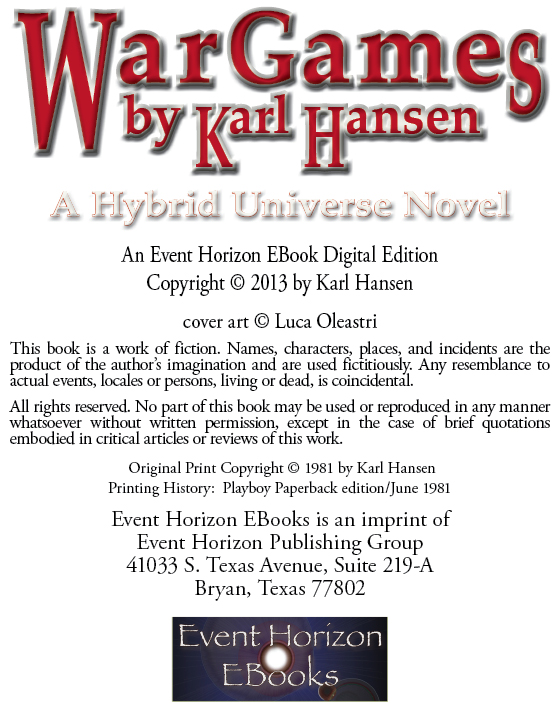War Games
Authors: Karl Hansen

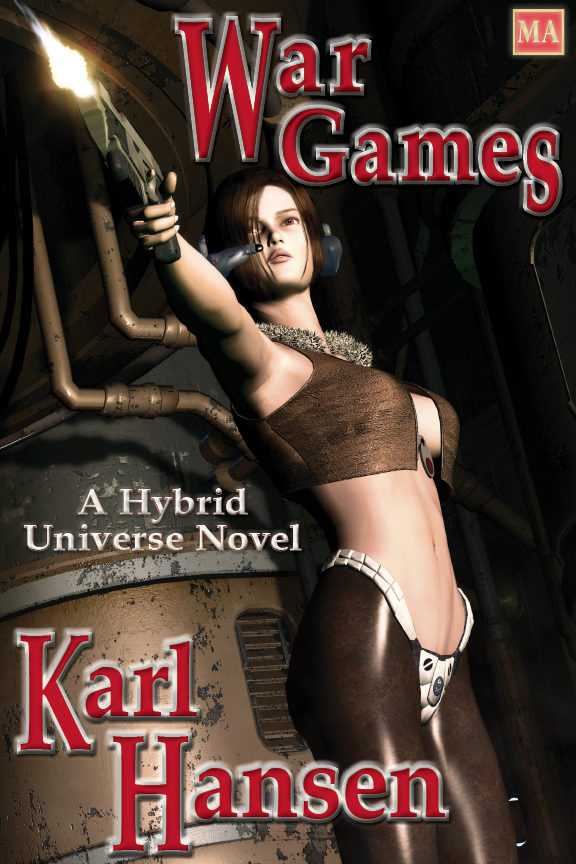
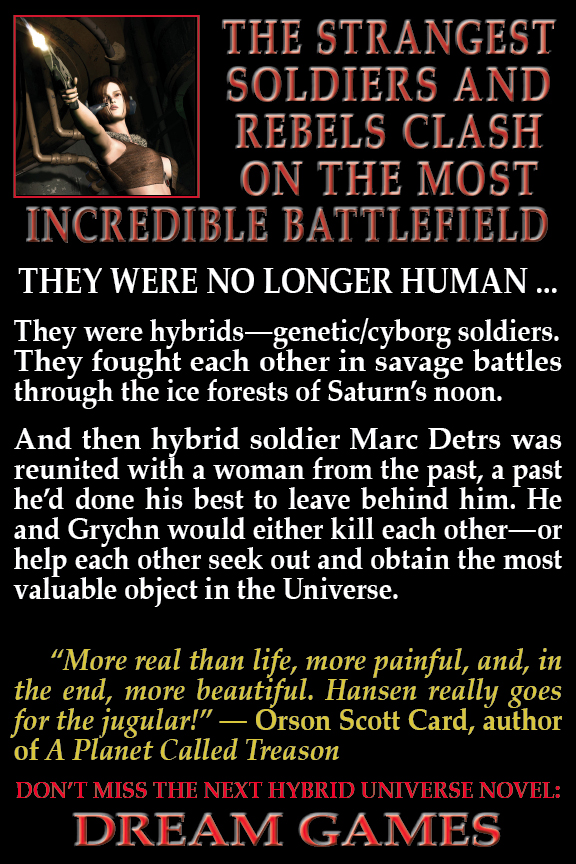
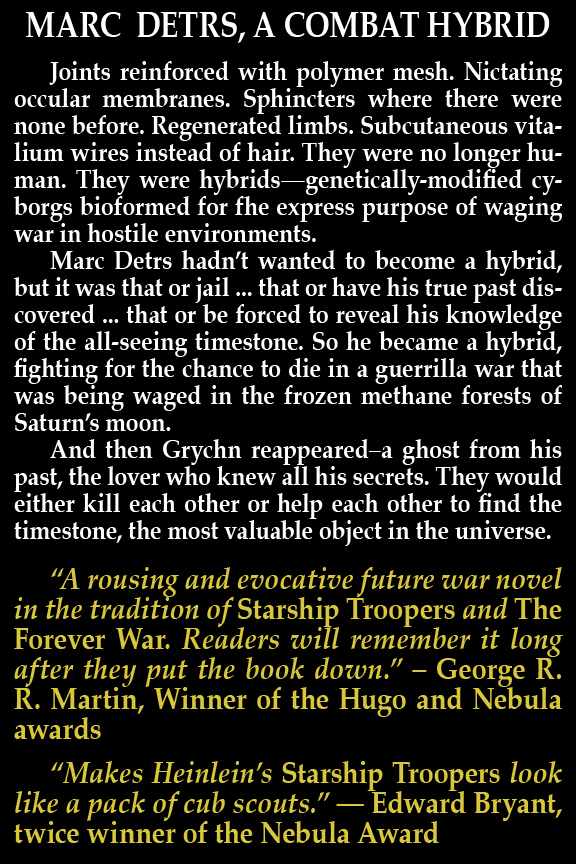
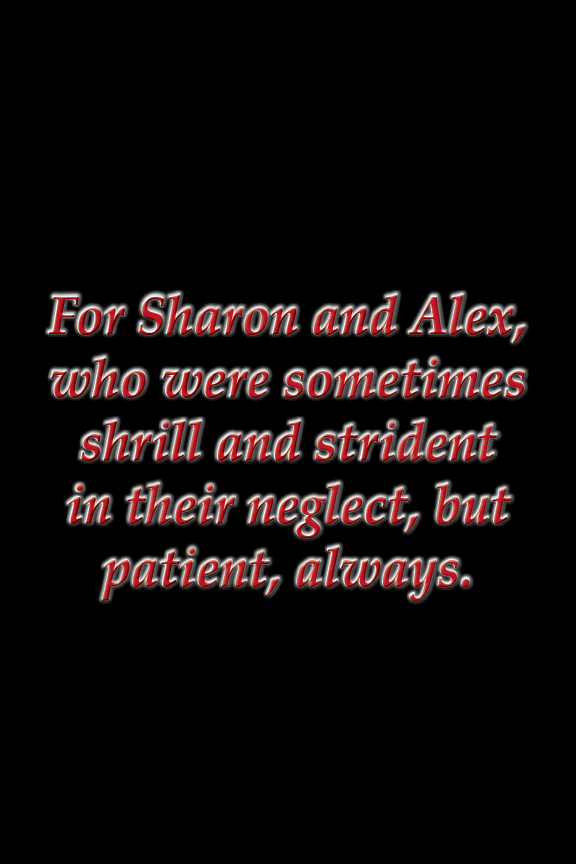
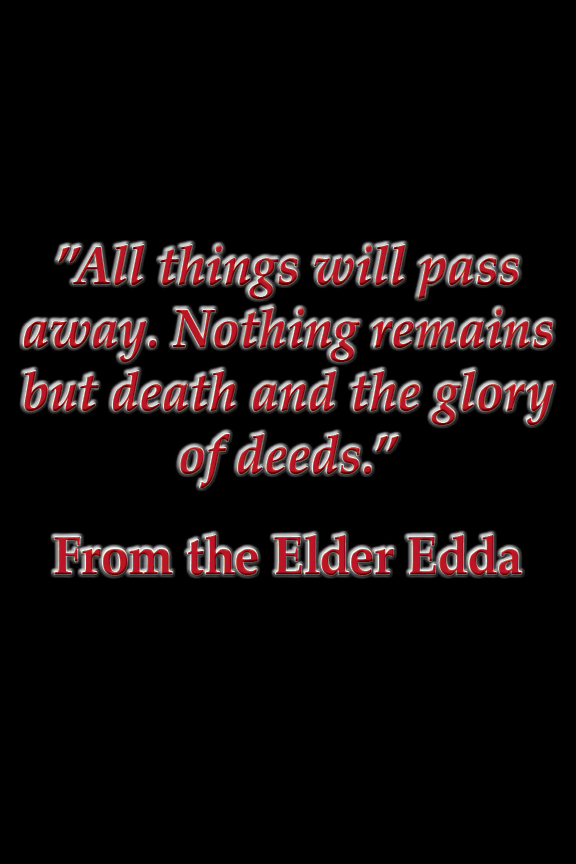
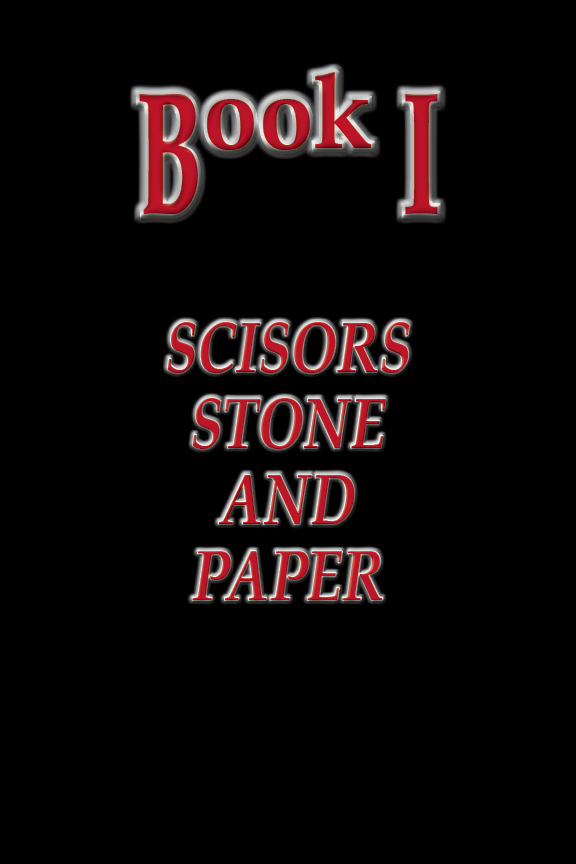

A STRANGER’S
face
peered into my cylindrical cell: turquoise eyes glittered behind the transparent washers of growing nictitating membranes; healing suture lines crisscrossed a bald skull; ears and nostrils puckered with internal sphincters; black freckles would soon be confluent. Dark thoughts were hidden in the face. Thoughts I’d guessed too well.
He watched me often, this stranger. Each day his face was a little different, its metamorphosis more nearly complete. I’d become impatient to see the final form of his disguise.
Red culture media swirled between my face and his. Tiny oxygen bubbles streamed into cosmic lines. I blinked. Film cleared from the stranger’s eyes. They followed my eyes, as though synchronized with gimbals. I blew media out my nose. Twin vortices spread from the stranger’s nostrils.
You’ve guessed my secret, of course. I was the stranger.
His face was an image of my own, reflected from the concave wall of a hybridization tank. His metamorphosis was only my own transformation, For a month I’d been watching the process.
My mouth grinned widely. My plan was working perfectIy. Before long, I’d be unrecognizable. My previous face and body would exist only as a holographic memory in the Corps’ master personnel files. And in my memory, as a death mask yet to be: eyes shattered into eggshells and popped from their sockets; tongue protruding from a mouth filled with frozen, foamy spit; skin as blue as a peeled grape. That image had tormented me for long days and longer nights before I devised a way to exorcise it from my thoughts. I had suffered considerable inconvenience and not a little discomfort to make sure I would never look like the face inserted in my mind by a vaporizing timestone. Why the paranoia? Because if I looked like that, I’d be dead.
I had alwas expected my own end to be random and totally unexpected—like a star winking out of an entropic sky. Death had had no substance before I wore the timestone. And after? It had too vivid an image then: frozen vitreous humor formed a filigree of frost behind ice cataracts.
I’d been warned. I hadn’t had enough sense to listen. What had the sailor called his chronotropic crystal? Deathstone. Yes, that was it. He left space to try to escape the scenario of his death, not knowing the scene was to be played on Earth. You saw an image of your own death in a timestone. You knew how your end would come. You might even guess where, umess the stone tricked you. But one crucial parameter was missing—you didn’t know when. A year. A hundred years. A thousand. There was no way to be sure. Not without another timestone. Mine was gone. There was only one other. I had to find it before death saw through my disguise. I knew how I was going to die. I didn’t know when it would be. It was as impossible for me to accept an incomplete knowledge of my fate as it was to resist the urge to cheat destiny.
So I’d devised a plan that would accomplish both.
Of course, there was no guarantee my scheme would work. But I’d alwavs been willing to take a gamble. Besides, I also always hedged my bets—you know, covered them both ways. So my plot had an elegant complexity beneath its apparent simplicity. Quite ingenious, actually.
How do you go about cheating death?
First, change your appearance more thoroughly than any disguise that could be purchased from a cosmetic surgeon, so even your basic gene structure is altered. Maybe that alone is enough to confuse the time matrix. But if it isn’t, there is still the other timestone. If it can be found. Only one man knows where he’s hidden it. And he is hiding himself, disguised in a mindrider’s body—trying to cheat his own destiny by endlessly trading bodies. If I could find him, I could find the other timestone,
Become someone else and find a timestone. Easy enough. Except I was in jail at the time, about to be sent to a prison farm where I’d have no control of my destiny at all. A real bitch, you say. You don’t know the half of it. But I’d figured out a way to do everything with one simple manipulation. Even get me out of jail and heading toward Titan, where I wanted to go anyway. I was a clever toad, I was.
But I couldn’t rid myself of the nagging doubt that it was futile to try to impose free will on a universe ruled by predestination. I had the terrible premonition I might have only moved myself to another curve on an equation with only one solution set, one common intersection, one locus!
I paddled with my good hand, rotating in my fluid-filled tank. My new face followed me around, staying in front of me on the mirrored interface of liquid/crystal. Subtle changes had occurred. Blue-flecked melanomae contained more pigment granules. Nictitating membrane edges grew closer together. I looked down. A strange body danced before me: tall and angular; lean, hard muscles twitched as new nerve fibers inserted endplates within them; long surgical scars faded; joints were still red and swollen from the polymer mesh used to reinforce their ligaments; bones had new tuberosities from their own reinforcement. I touched places still sore from cybersurgery. Then I clutched my genitals, finding reassurance in their familiar softness. I held my penis in my hand. It seemed unchanged. It looked the same. But I knew otherwise. I flexed a newly augmented cremaster muscle. My scrotum tightened, pulling into its pouch inside my pelvis. My penis followed, slipping out of my hand to retract between my legs in reverse coitus. Pretty slick, huh?
By now you’ve guessed my plan. At least the first part. You know what creature I am becoming.
You must think me mad.
Sometimes I wonder.
The stranger smiled. Red light gleamed from his eyes, darkening to purple. He knew what madness lay within.

STARLIGHT SPARKLED
from somewhere overhead, blurred into red kaleidoscopy by layers of culture media. A brighter red shone from my cell’s side, growing stronger. I moved toward it, pressing my face close to the wall. Across a cratered plain a bright disk rose from the horizon. White clouds swirled across blue sea. The green of land almost seemed incidental. Earth-light cast harsh shadows from crater rims.
Some way to visit Luna. Six weeks inside a hybridization pod no bigger than a coffin. On the Darkside, yet. Knowing on the other side of the Moon any vice you wanted could be found in one pleasure dome or another. Vice was one thing that never got boring. Itching did.
I’d caught an itch worse than any I’d ever got from all the stinking jail cells I’d visited on Earth. And I’d languished in plenty at one time or another. So I knew something about itches. But this one was something else.
Have you ever itched deep inside where you couldn’t scratch? I mean everywhere inside. From toes to head. They said it was a side effect of the transforming viruses that inserted xenogenes into your tissues. Sort of like having internal chicken pox. Not that I’d ever had any kind of chicken pox. But I’d heard of the old plagues. And this was as close as you could get to having a disease nowadays. And there was still healing occurring around all the plastic and metal implants. Healing tissues itched as much as infected ones. But even though I couldn’t scratch, I could ignore those itches. The one in my mind was another matter. How do you ignore an itch in your thoughts? That was a side effect of both the vitalium wires that had been implanted in my brain and the hypnotraining broadcasts they were now receiving.
Six months of basic training and a year of advanced could thus be crammed into six weeks of hypnobeams. Hand-to-hand, small arms, jump school, Ranger training, demolitions, toxicology, heavy pulsars, you name it. That certainly avoided a lot of grunting and sweating. Small comfort.
Breathing liquid culture media wasn’t all that pleasant, either. Despite the knowledge that oxygenation was occurring extra corporally, you felt like you were drowning. For six weeks.
And boring. What could be worse than floating inside a two-by-one-half-meter glass cylinder, surrounded by similar cylinders arranged into hundred-meter-diameter disks, which were in turn stacked into tiers. Like a giant glass wasp nest. Not a bad analogy. We were like pupae undergoing metamorphosis.
I brought my left arm close to my face and opened my eyes. Red culture media blurred my vision, but I could see well enough to be sure now. A bud was sprouting from the stump of my left arm. Five smaller nodules studded the surface of the bud. I resisted an urge to scratch it.
Itching. Drowning. Boring.
Believe it or not, it could have been worse. I shouldn’t complain. I wasn’t in jail. I was off the Earth, partway to Titan. (The Corps had their hybridization tanks on Luna. Something about needing vacuum to maintain sterility.) In two more weeks, I’d be on Titan. There to fight a war, the Lord Generals thought. Only I had other ideas. A timestone waited for me there. Or at least the mind of a miner who knew where it could be found. I needed the timestone to regain control of my own destiny. So I had better things to do than be killed in a messy little rebellion.
My name? Let me think. I’ve used so many. Ah, yes. Detrs. Marc Detrs. I was twenty years old.
I had already renounced a noble legacy. I could have been a Lord of Earth, for what that was worth. I’d accumulated my own fortune. Some of it in sporting ventures, the rest by illegal means. But all of it was safely laundered and hidden away in secret accounts. When my brilliant criminal career had been cut as short as my left arm, I’d turned down a hand-slap stay on a prison farm and volunteered for the Corps. AIl those sacrifices just so I could become an ordinary grunt combrid and be sent about a billion kilometers away to fight a foreign war. In which the average life expectancy of a combrid was just short of sixty days.
You must think I’m crazy.
Maybe I am. But there’s a method also.
What desperation drove me to such rashness? That’s easy. A timestone showed me my death. Rash measures are required to cheat destiny. I had to take a gamble. Shoot the works on one roll.
But let me explain. It’s a little complicated, after all. There’s plenty of time. About two more weeks, actually. Take my mind off the itching, anyway.
* * *
The Hybrid Wars had been going on for as long as I could remember, but they had never seemed entirely real. The holos made war into grand adventure. Each night they brought a fragment of heroic fantasy into the living rooms of old Earth. There was lots of exotic scenery: Martian deserts, volcanoes on Io, vapor canyons on Europa, Titanian crystal forests, the hydrocarbon glaciers of Iapetus. And it was the stuff of heroes: outnumbered Terran troops bravely defending the Empire from rebel brigands. Sailors scurried among the rigging of gravships patrolling the space Ianes, cyrines streaked across the vacuum of boarding wires to fight hand to hand among the struts of pirate ships, sleek trigee fighters rose from their carriers to engage rebel craft—bright pulsar beams stabbed into the darkness between stars, seeking targets as fleeting as tumbling meteors. Dogfights happened so quickly the details could only be perceived by battle computers. Fighter pilots didn’t have time to think; they relied on instincts transplanted into their brains with xenogenes—instincts that enabled them to react faster than thought. Death came with a silent implosion and was equally quick.
Although I admired sailors and fliers and cyrines, they were not my heroes. I didn’t become one of them in my dreams. My imagination was captured by the Combrid Corps’ Ghost Cavalry. Combat hybrids manned the garrisons on the colony worlds. They ended up doing most of the fighting. Earth controlled the space lanes. Rebels only made token sorties into space. But on the ground, it was another matter altogether. There, rebels had the advantage. After all, it was their native land. They knew the terrain and had the support of the local populace. The Corps tried to control strategic areas and to keep commerce from being interrupted. The rebels could have the rest; Earth only wanted the steady flow of raw material from her colonies. Permanent combrid garrisons had been established to insure this. Of course, this permanence made Corps facilities vulnerable to hit-and-run attacks by rebels. To counter this, the Corps conducted pre-emptive strikes of their own, using Ghost Cavalry units. Needless to say, I fell in love with the cavalry.
What three-year-old wouldn’t? The holos gave them lots of air time. Hoverbuses darted about like flying metal spiders, disgorging combrids from their bellies. The Ghost Cavalry then floated gently to ground, supported by pseudograv thrusters in their battle packs, firing bursts of pulsar beams downward, protecting their descent. They certainly looked impressive. Combat armor blended perfectly with any background, making combrids as hard to distinguish as wraiths. Their faces were hidden behind mirrored visors. They were stronger and faster than any human had a right to be, but then they were not quite human. They were the elite of the Foreign Legions. Or so the holos made them out.
Now I know it was all recruiting propaganda. But then I didn’t. For an hour each evening I could watch them doing battle in living 3-D color, courtesy of the holovision networks. I had my own one-watt, rapid-cycling laser pistol. I could stand shoulder to shoulder with my beloved combrids, fighting for the glory of the Corps, blasting elves, scorching sphinxes, wasting Martians, and sparing no quarter with sundry other rebellious hybrid races. For that hour I was as happy as I thought I could be. The stroboscopic flashes of my toy laser soothed away the frustrations of a troubled child. Later, after my parents tired of their games, I could relive that day’s firefight in my dreams, sleeping with my toy gun in my hand. Before morning came, I would awaken to bright laser flashes and find my finger clenched in spasm on the trigger of the pistol.
I would have given anything to have been old enough to run off and join the Ghost Cavalry. They wouldn’t take you until you were sixteen. That became my passion, my reason for living. All day, I played make-believe, dressed in my own combat armor, firing my own toy laser. Each evening I watched Ghost Cavalry ride into battle. Later, after there were no more tears to cry and the pain from my parents’ games had faded, I crept into their room, where they lay sprawled in peptide stupor. As I played harmless laser flashes across their bodies, how I wished I had a real pulsar. How I longed for the day when I could run away.
Several years later my father told me the truth about the Combrid Corps and the other Foreign Legions. He laughed when he told me I could never join. For I was heir to a Lord of Nyssa. I was the last of my line. Someday I would be a Lord myself. They would never take a sole surviving son into the Legions.
A different kind went to the Legions,
my father said. A kind I would never be.
Then his laughter became mocking. He smiled slyly.
Besides,
he said,
Henri went to the Legions first. Your brother waits for you there. Remember what he did to make them take him away from us and give him a new psyche? Remember Hide and Seek? Henri still plays that game. Henri still wants to play it with his little brother.
The dreams bothered me for a long time after that.
And I’d believed him. I thought I couldn’t run away with the Legions.
But there was nothing to keep me from just running away.
